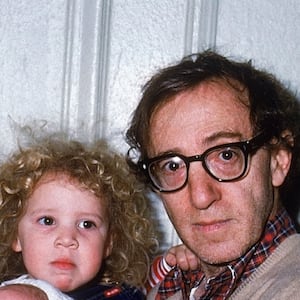On the night of Sunday, Feb. 21, the press received an emailed statement from Woody Allen and Soon-Yi denouncing the HBO docuseries Allen v. Farrow.
“Over the past few weeks, we have received many requests to comment on the HBO documentary Allen v. Farrow. Below please find a statement, attributable to a spokesperson for Woody Allen and Soon-Yi Previn. Thank you,” the email read.
<p><em>“These documentarians had no interest in the truth. Instead, they spent years surreptitiously collaborating with the Farrows and their enablers to put together a hatchet job riddled with falsehoods. Woody and Soon-Yi were approached less than two months ago and given only a matter of days ‘to respond.’ Of course, they declined to do so.</em><em>“As has been known for decades, these allegations are categorically false. Multiple agencies investigated them at the time and found that, whatever Dylan Farrow may have been led to believe, absolutely no abuse had ever taken place. It is sadly unsurprising that the network to air this is HBO—which has a standing production deal and business relationship with Ronan Farrow. While this shoddy hit piece may gain attention, it does not change the facts.”</em></p>
The email was sent at 10:17 p.m. EST, just minutes after the premiere episode of Allen v. Farrow had aired on the East Coast, and came from none other than Letty Aronson, Woody Allen’s sister who is now apparently acting as his publicist.
As Allen v. Farrow filmmakers Kirby Dick and Amy Ziering tell it, they gave Allen and Soon-Yi two weeks to comment on the specific allegations made in their documentary series, which is more than ample time by journalistic standards. (Most powerful people accused of predation are given just days to respond, in case they potentially try to intimidate witnesses or their accusers.)
“Not only did they have time to comment, but keep in mind that this was during COVID, and we would have been happy to have done this interview even remotely,” Dick tells The Daily Beast. “Somebody just had to sit down in front of their computer and speak, so it was the easiest time for them to find a time and a way to do this. They had plenty of time. We would have loved to have spoken with Woody and loved to have spoken with Soon-Yi, and heard their side and their perspective.”
“If you had nothing to hide, and you were really being falsely maligned, wouldn’t you want to speak to journalists?” adds Ziering. “What are you afraid of? We wouldn’t be able to put anything in that was false. That’s not what we do. We want to hear it, and we don’t want to get this wrong. So I don’t get it. You’re only going to speak when you have a press conference, or when you’re sitting down for 60 Minutes, or when you’re sitting in on your wife’s interview?”
Both Dick and Ziering, who also directed the documentaries The Invisible War, about rape in the military, The Hunting Ground, about rape on U.S. college campuses, and On the Record, about the rape allegations against hip-hop mogul Russell Simmons, also say they reached out to Allen for comment several years ago. That was around the time they first interviewed Dylan in February 2018, although they say the project had a different focus then—one more broadly on the #MeToo movement—so their comment request concerned Allen’s statement calling himself the “poster boy” of #MeToo.
Episode 3 of Allen v. Farrow explores how the typically reclusive Allen unleashed a press offensive once the investigation into his alleged child sexual abuse was first announced. He held a press conference at The Plaza hotel in Manhattan where he publicly declared his love for Soon-Yi, Farrow’s college-aged daughter, whom he’d helped raise, and branded Mia Farrow an abusive and manipulative parent who’d coached Dylan into making the confession. Allen’s now-wife, Soon-Yi, and his adopted son Moses Farrow—whose life Allen mysteriously re-entered just before the Dylan allegation resurfaced in 2014—have backed Allen’s narrative. Mia Farrow, Ronan Farrow, Daisy Previn, Fletcher Previn, Kaeli-Sha Farrow, Matthew Previn, Sascha Previn, Isaiah Farrow, and Quincy Farrow all support Dylan and have said Mia is a good mother. (Neighbors, babysitters, Connecticut state officials, and family friends have also backed Dylan and Mia.)
“A perfect strategy is to bait and switch,” explains Ziering. “Mia is not on trial. If you commit an offense, it doesn’t matter what everyone else around you is doing, so I just want to be wary of any narrative that starts criticizing any unrelated actions, because it’s spurious. It’s just white noise. The best defense is a good offense, so you go on the offensive and declare the person crazy, which is what Woody did. But all of this, ‘Let’s look into her as a parent,’ that’s just misogyny and character assassination that has nothing to do with it.”
“Imagine if Mia is guilty of anything they allege. That wouldn’t necessarily obviate the fact that he allegedly molested his child,” she adds.
Both Dick and Ziering say they—along with their chief reporter/investigator, Amy Herdy, a journalist—thoroughly probed the allegations of abuse against Mia Farrow leveled by Allen’s camp and that they found no evidence to support them.

Dylan and Mia Farrow.
HBO“There was no record of any of this [abuse by Mia], and there would have been ample opportunity for any of the children to tell this to pediatricians, to babysitters. We tried to find corroboration for that, and we could not. And we worked very hard on that and were very curious,” offers Ziering. “We couldn’t find any eyewitnesses, any police reports, any complaints to child welfare agencies, any history of this ever being mentioned, and that was a very public family with lots of people coming in and out—friends, babysitters, nannies, tutors, teachers. On the contrary, when we interrogated these people and asked what they thought of their experiences, it was the polar opposite.”
Dick and Ziering also observed hours and hours of home videos of the Allen-Farrow family, which showed them “a family that was very loving,” with Mia “knitting stockings, building dollhouses from scratch, having friends come over, taping Soon-Yi as a child so that later on she’ll have the memory, bringing children on set with her.” As Vanity Fair reported, Soon-Yi had experienced horrible abuse at the hands of her biological mother, who would allegedly “force Soon-Yi to kneel in a doorway, and she would slam the door against the little girl’s head,” before abandoning her on the street in Seoul. Mia Farrow fought like hell to adopt Soon-Yi, even changing the law to do so.
“Mia waited almost a year to get her, and finally had to request that Congress change the law that limited the number of alien children an American family could adopt,” reported Vanity Fair. “She then stayed at the orphanage in Seoul washing dishes for 10 days until Soon-Yi’s papers came through. In order to get to know the child, Mia brought her a doll and a pretty new dress.”
Mia’s motherly bona fides were supported by Allison Stickland, a family friend’s nanny who said she’d witnessed Woody Allen burying his head in the lap of Dylan Farrow.
“I thought it was a lovely household. Lovely children, they all got along well together. There never seemed to be any sibling rivalry. The older children I would say had fun with the younger ones. It was just very happy. I wouldn’t say it was troubled at all,” said Stickland on a recent podcast episode with Dick, Ziering, and Herdy. “I thought [Mia] was lovely. She was a very soft-spoken, gentle lady. Very attentive. You could tell it was so obvious that she adored all her children.”
Dick reiterates that they would have loved nothing more than to interview Allen and Soon-Yi for Allen v. Farrow, but they refused. (Allen has also, through his sister, declined my request for an interview.)
“We looked into everything. We did leave no stone unturned. We have no agenda. We would have welcomed talking to Woody and Soon-Yi. We asked to do that,” maintains Dick. “We read his books, read all his interviews, read his court testimony, and were very interested in his side. All we did was follow where the facts led us, and where we could find corroboration, and what the evidence presented to us as the truth, and that’s what we show.”
Read more from Kirby Dick, Amy Ziering and Amy Herdy on Moses Farrow, the train set, and more after next week’s episode of Allen v. Farrow.



